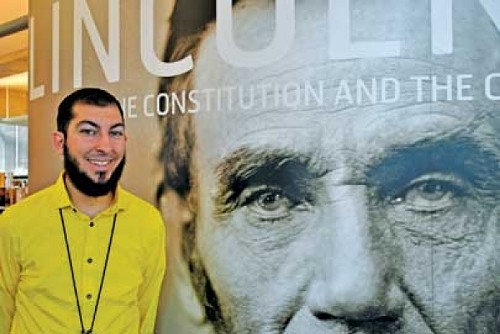If your DVD of the Academy Award-nominated Lincoln is already wearing out and Feb. 12, 2014, feels like an eternity from now, don’t be melancholy—this Saturday, May 18, provides the opportunity for you to don your stovepipe hat and fake beard and head to the Salt Lake City Main Library (210 E. 400 South, 801-524-8200, SLCPL.org) for a mini Abraham Lincoln festival. The Fort Douglas Living History Detachment Civil War Re-Enactors will be on hand from noon to 3 p.m., but Daniel Day-Lewis presumably won’t—so the field in the Lincoln look-alike contest (2:45 p.m.) is wide open. At 3 p.m., local historian Will Bagley will be giving a lecture about the tensions between the state and the federal government during Lincoln’s time. And, through May 31, the traveling exhibit Lincoln: The Constitution & the Civil War, presented jointly by the American Library Association, the National Endowment for the Humanities and the National Constitution Center, will be on display on the first floor of the library. Associate librarian Patrick Hoecherl, himself a Lincoln look-alike contender, talked with City Weekly about why Lincoln is such an enduring figure.
Why do you think there’s such an interest in Lincoln?
He’s someone who transcends party lines—Republicans claim him because he was a Republican president, but he’s got a lot of progressive ideas that liberals can identify with as well. It’s kind of interesting, because in his time, he was a really controversial president—he barely won the election. But now we all love him. You never know—that’s the thing with history. Sometimes you need that 50, 100 years to look back before you really see how we think of someone.
Is there going to be a Civil War battle at the library?
There’s no battle, no—I don’t think I could get the city agree to firing muskets out there. They’ll be doing living-history camps, with different aspects of a soldier’s life in the Civil War, and also some more civilian things. You’ll be able to go up to the people and interact with some of the things they’ve got set up. It’s a way for people to familiarize themselves a little with what life was like 150 years ago.
What was Utah doing during the Civil War?
There were federal troops that were here the whole time during the Civil War. There was a lot of tension between the federal government and the Mormon pioneers who were here at the time. Fort Douglas was an active garrison throughout the war, and I think a lot of it was to keep an eye on the people here, because there was a genuine fear of rebellion. Will Bagley, a local historian, he’ll do a talk on Utah during the Civil War, what public perception of Lincoln was—both by the general populace and by the leadership here in Utah at the time.
What’s the Constitution & the Civil War exhibit about?
It’s all about the constitutional challenges that Lincoln faced during the Civil War. It’s divided into three major parts. The first is Divided, which asks the question of whether the United States was an indivisible nation or a collection of sovereign states—the question of states’ rights versus federal authority. The next part of the exhibit is Bound, and it deals with the issue of slavery, and how Lincoln struggled with that issue throughout the war. It had been a challenge for the United States since it was founded—slavery’s mentioned, briefly, in the Constitution, so it’s a question of whether the United States could continue with slavery, or were the moral objections to it too great, making it something that needed to be fought and destroyed. The final part of the exhibit is called Dissent, about some of the wartime powers that Lincoln assumed—things like the wartime draft, and the suspension of habeas corpus. It’s kind of asking questions about how much freedom we are willing to give up during a time of war. They are problems that we still face today.
That’s part of what makes this exhibition really relevant—they are kind of these deep-seated questions that we have about the Constitution and what it means. They were asking the same questions in 1860 that we’re still asking in 2013.
Twitter: @RachelTachel
More by Rachel Piper
-
The Big Read
Debbie Ehrman and Tommy Hamby on the shared reading experience
- Feb 4, 2015
-
Brooke Young of the Printz Award Committee
Awarding excellent books for young adults
- Jan 28, 2015
-
Linda Strasburg: InterViews & InterActions
Utah's longest-running female radio personality
- Jan 21, 2015
- More »





